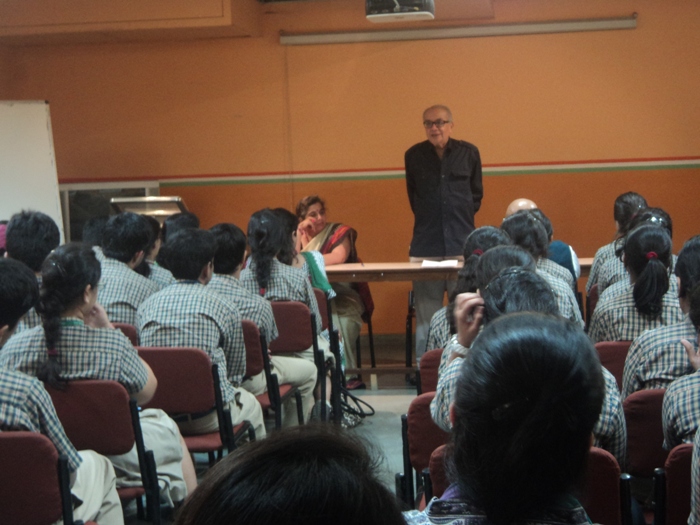The Partition of India - a conversation with our School Chairman.
A moment comes, said Jawaharlal Nehru addressing his countrymen as Indias first Prime minister ..which comes but rarely comes in history when we step out from the old to the new, when an age ends and when the soul of the nation long suppressed finds utterance.
This moment was the stroke of midnight August 14-15, 1947 when the British colony of India was replaced by two independent countries, India and Pakistan.
The Raj was gone but Indias partition triggered an unprecedented wave of violence and the subcontinent was plunged into chaos and discard.
On 31 October, 2013, School Chairman Shri Prafull Goradia who, from time to time, speaks to the senior students on wide-ranging subjects, chose to chat with class 11 about the Partition of India, it's reasons and it's ramifications.
Mr. Goradia started the discussion with a nostalgic anecdote, about an incident on the eve of independence when, as a young boy, he fell terribly ill, Sirs mother wanted to take him to the doctor but he was reluctant. Sir, like millions of Indians around him was affected by from the feeling of shock and bewilderment at the enormous violence and depravity that engulfed the sub-continent.
The students were anxious to know as to how far Jinnah, Nehru and Gandhi were responsible for this cataclysmic event. To this Sir replied that partition was a liberating experience, a logical culmination of a long historical process that started in the 19th century with the Aligarh Movement.
Sir Sayyid Ahmed Khan established the Mohammed Anglo- Oriental College in 1875 with the purpose of constructing and consolidating among it's muslim students, the attitude, as it were, of belonging to a ' quam' and to prepare the new generation of muslims for the opportunities that arrived with British rule. As far as the process of learning was concerned, these students did not have much of an edge over others, but what they distinctly picked up here was the ethos of solidarity. Their European Principal, Theodre Beek only added fuel to the fire that had been set alight.
Chairman Sir further added that movements like ' Music before Mosque' and the CowProtection Movement deepened the rift between the two major communities in the 1920s and 1930s.
Within this socio-cultural milieu of estrangement and distrust, the notion of muslim nationhood started to germinate. In 1930 Sir Mohammad Iqbal who wrote the immortal Sare Jahan Se Acha Hindustan Hamara" , as president of the Muslim league proposed the reorganisation of the muslim majority areas in nort-west India within theIndian federation.
The idea was further accentuated by the Cambridge University student Chaudhary Rahmat Ali in 1933 when he coined the name, " Pakistan" as a separate entity. No one took Rahmat Ali seriously in the 1930s, infact the Muslim leaders dismissed his idea merely as a students dream!
Mr. Goraia told the students that it was the Lahore Resolution of 1940 which signalled the transformation of the community from a minority and also gave prominence to Quaid-e-Azam, Muhammad Ali Jinnah as the chief spokesperson of the muslims.
Students were surprised to learn that till 1940 the Muslim League did not seriously raise the demand for Pakistan as a sovereign state. Even Jinnah used the idea of Pakistan as a bargaining lever to block possible British concessions to the congress and mobilising additional favours for the muslims.
The aftermath of the Second World War brought the British Raj to it's knees and the government in Britain decided to surrender their prize jewel as soon as possible. But who should be handed power was the most pertinent question! By 1946 the Muslim League had unleashed a hysteria with the Two Nation Theory. From Noahkhali to Calcutta, Bihar to Amritsar and Lahore, the entire nation was steeped in merciless mayhem. It was to halt this nightmare that Partition became necessary.
Sirs reflections helped the students visualise how the persistence for partition campaign was an orchestrated campaign. It is a lesson from history that fundamental forces can be stopped only if those of us who are secular and humanistic join together to conform the cancer.
Ms. Charu Bhatnagar.













